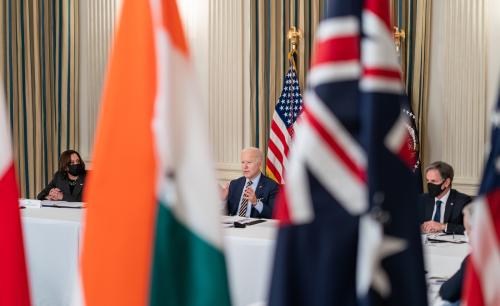

An independent, multi-sector task force to determine how information and technology can enhance national security was announced today by the Markle Foundation in alliance with the Center for Strategic and International Studies (CSIS) and the Brookings Institution.
The Task Force on National Security in the Information Age is co-chaired by Markle Foundation president Zoë Baird and former Netscape Communications chairman James Barksdale. It will include leaders from industry, government, and the civil liberties community. Participants include EdVenture Holdings chairman Esther Dyson, Sun Microsystems chief researcher John Gage, Governor Mike Leavitt of Utah, and former National Security Agency deputy director Bill Crowell, among many others.
In the months since September 11, military, intelligence, and law enforcement experts have increasingly recognized the critical role that information plays in national security. However, experts agree that efforts to enable better collection and sharing of information require clearer definition of the roles of government agencies, better assessment of new technologies for improved information handling, and careful consideration of how to expand the use of information while safeguarding civil liberties. The group will allow thought leaders from a wide variety of relevant fields to address these matters together.
“Information is the key to a more secure society. As we expand the role of information collection and sharing, let’s be sure we also protect the democratic freedoms that make our society worth securing,” said Ms. Baird. “This task force is the kind of broad, multi-sectoral effort needed to address these imperatives and create a viable framework for moving forward.”
The task force will make recommendations regarding:
“New technologies, applied appropriately, can effectively transform our ability to meet the security challenges of the twenty-first century,” said John Hamre, president of CSIS.
“This task force will develop the comprehensive conceptual framework that is needed to identify the information gaps and drive a strategy for remedying them.”
Over the next year, the group will release policy and briefing papers, provide information on promising technologies and inform government officials. The ultimate goal is to produce a broad and coherent strategic vision that will enable the U.S. government, in collaboration with industry and civil society, to meet the challenge of the new security environment in an information age.
Current participants in the Task Force on National Security in the Information Age:
Michael H. Armacost, President, The Brookings Institution
Robert Atkinson, Progressive Policy Institute
Stewart Baker, Lawyer, Steptoe & Johnson
Jerry Berman, Executive Director, Center For Democracy & Technology
Robert Bryant, President & CEO, The National Insurance Crime Bureau
William Crowell, President & CEO, CyLink Corporation
Esther Dyson, Chairman, EdVenture Holdings
David Farber, Professor of Telecommunication Systems, University of Pennsylvania School of Engineering
John Gage, Chief Researcher, Sun Microsystems
John Hamre, President, Center for Strategic and International Studies
Eric Holder, Partner, Covington & Burling
Arnold Kanter, Principal, The Scowcroft Group
Robert Kimmitt, Executive Vice President of Global and Strategic Policy, AOL Time Warner, Inc.
Michael Leavitt, Governor of Utah
Tara Lemmey, Founding Partner & CEO, Project LENS
Judy Miller, Lawyer, Williams & Connolly
Jim Morris, Dean, Carnegie Mellon School of Computer Science
Jeffrey Smith, Partner, Arnold & Porter
Abraham Sofaer, Senior Fellow, Hoover Institution, Stanford University
Paul Schott Stevens, Partner, Financial Services, Privacy Law, Dechert
Rick White, President & CEO, TechNet
About the Markle Foundation
The Markle Foundation works to realize the potential of emerging communications media and information technology to improve people’s lives, through its own programs of grants, investments, research and public education. Markle recently committed $100 million to its efforts in public policy, health care and children’s learning. For more information see www.markle.org.
About the Center for Strategic & International Studies (CSIS)
For four decades, CSIS has been dedicated to providing world leaders with strategic insights on-solutions to-current and emerging global issues. CSIS maintains resident experts on all the world’s major geographical regions and is committed to helping develop new methods of governance for the global age. Its audiences include public and private policymakers in the United States and around the world. For more information, see www.csis.org.
About the Brookings Institution
The Brookings Institution is an independent, nonpartisan research organization, which seeks to improve the performance and quality of U.S. public policies. It addresses current and emerging policy challenges and offers practical recommendations for dealing with them, expressed in language that is accessible to policymakers and the general public alike. For more information, see brookings-edu-2023.go-vip.net.

Tanvi Madan
October 22, 2022
2022
Online Only
12:00 pm - 1:30 pm EDT

Sarah Kreps, Richard Li
February 1, 2022